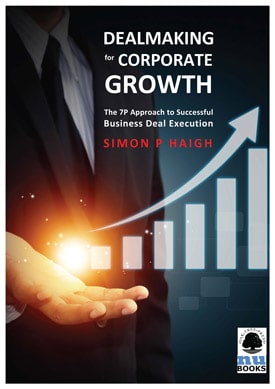By Simon Haigh, author, entrepreneur and investor
Simon Haigh demonstrates the critical importance of the power balance in dealmaking and how you can ensure you have the upper hand.
Information can clearly build your power. It follows that, as information underpins knowledge, converting information into knowledge produces the opportunity for even more power.
Understanding the relevance and importance of information and how it can be leveraged can assist in building your power.
Information for information’s sake is worthless: what matters is how you apply or use the information in the context of the deal. Receiving valuable or meaningful information at the right time can provide you with the power to support your most important issues.
This in turn can assist you to understand what the important or primary and secondary issues are for the other side. Even the act of deciding which information to provide or withhold and how best to do this can significantly enhance the dealmaker’s position.
Information can be given through many methods, ranging from direct, unambiguous statements to gestures, suggestions, innuendos and subtle hints.
Never underestimate the power of seeing things through the perspective of the other side in a deal in terms of your dealmaking strength
One thing is for sure: the dealmaker needs to consciously decide which information to give in order to provide maximum leverage to his or her deal. But, remember, information flow is not a one-way street. If you use information as power to compromise the other side, you will quickly find that other people stop sharing information with you – so you must use information responsibly.
Never underestimate the power of seeing things through the perspective of the other side in a deal in terms of your dealmaking strength. The best way to know what the other side wants is to ask them and then to actively listen to their response.
By using active listening skills, you can pick up hints, clues and other signals from body language, movements, volume and tone from which you ultimately may be able to assess the other side’s positioning, likely flexibility and direction.
A good dealmaker needs to be fully present and engaged in the communication, with both body and mind actively involved. Active listening also requires you to ask questions, nod encouragement and partake in other to-and-fro activities and signals. Done the right way, you can significantly enhance your power.
BUILD RELATIONSHIPS
The closer you get to knowing the intentions, desires and assumptions of the other side in a deal, the more likely you are to ultimately get what you want from the deal.
So, using networks and relationships is a very important additional way for dealmakers to gather the all-important information they need, which then enhances their knowledge and ultimately their power. This is particularly the case if the network or relationship connects you to the key decision-maker(s) on the other side.
In my experience, you are more likely to successfully execute business deals for a longer, more sustained period of time if you do so through relationships built upon mutual trust. How long it takes to build mutual trust depends on many variable factors.
 MIND GAMES
MIND GAMES
Careful planning allows you to frame your preparations for maximum effect and maximum deal power, highlighting your potential deal strengths and weaknesses and providing you with the ability to fix any holes in your position.
Perception is an extremely powerful power source in dealmaking: perceived power can be as powerful as actual power
As with planning, do not cut corners. As a first step, conduct a comprehensive assessment of relative power between both sides. Your relative power directly impacts your ability to execute deals. In fact, relative power is one of the most important factors that can determine the outcome of a deal.
Deal power is a frame of mind and can be developed. Power is not static. It usually ebbs and flows during a deal and can change sides very quickly. Whether you like it or not, your power is always influenced by your credibility, legitimacy, knowledge, authority, appearance and influence.
Perception is an extremely powerful power source in dealmaking: perceived power can be as powerful as actual power. So focus on building the appearance (or at least the perception) of your own power.
Finally, using a time-out at the right time in the deal process can give you more power. On the other hand, be careful of excessive time-outs from the other side, which may be simply a strategy adopted to avoid dealing with an issue – I have seen several deals jeopardised in this way.
The above is an extract is taken from Dealmaking for Corporate Growth: The 7P Approach To Successful Deal Execution by Simon Haigh, published by NuBooks, an imprint of Oak Tree Press and available from www.successstore.com.
 About the blogger
About the blogger
With over 24 years of international experience, Simon Haigh has a history of C-suite/executive roles with Dell, BHP, Xilinx, NANA and leading global law firms in US, Europe, Australia and Asia Pacific.
He has written two books: Dealmaking for Corporate Growth: The 7P Approach to Successful Business Deal Execution and Contract Law in an E-Commerce Age.




